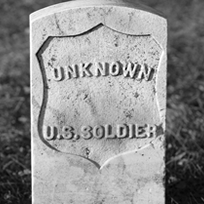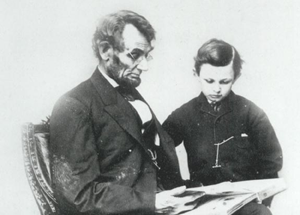Remembering the Gettysburg Address
Discussion & Writing

Start your discussions
In commemoration of the 150th anniversary of the Gettysburg Address we would like to encourage everyone to discuss the meaning and historical significance of this important speech. Below are some suggested questions to help get the discussions started in the classroom and the dining room table.
We would like to hear your ideas. Please share your own discussion starter ideas.
Text Analysis Questions

- What happened "four score and seven years ago"? Why does Lincoln start with this?
- In the first sentence, what does Lincoln tell us about this new nation?
- What is being tested by this war?
- What impact does starting the second paragraph with "now" have on its meaning?
- When Lincoln says the nation was "so conceived and so dedicated" what is he referring to?
- What is the point including the phrase "or any nation so conceived and so dedicated" - what would the sentence mean without it?
- What if Lincoln had used the verb "start" instead of "conceive?"
- What are the people who are assembled at Gettysburg there to do?
- What did those who fought at Gettysburg do that those who have gathered cannot?
- What is the impact of starting the third paragraph with "but"?
- What does Lincoln describe as the impact of those who fought at Gettysburg?
- What does Lincoln mean by "the great task remaining"?
- What is the unfinished work that those listening to the speech are asked to achieve?
- How does Lincoln use the idea of "unfinished work" to assign responsibility to his listeners?
- What specific ideas does Lincoln ask his listeners to commit themselves to at the end of his speech?
- "Increased devotion to that cause". What cause is this?
- How does the meaning of the word "dedicate" change over the course of the text, and what does it reveal about the Gettysburg address?
(From EngageNY.org of the NewYork State Education Department. Internet. Accessed September 12, 2013.)
Social Studies/History Questions

- Lincoln never mentions the word "union" over the course of his speech, instead repeatedly referring to the "nation" instead. What is the effect of selecting one word instead of the other?
- What is another word one might expect Lincoln to use in a speech during the Civil War that does not appear in the speech? What is the effect of it not being mentioned?
- What do you make of Lincoln's choice to name the Declaration of Independence as the moment of founding of America?
- Research the following - how are they related to the Gettysburg story? Sarah Hale, Lydia Smith, and Basil Biggs
Analysis Questions for Today

- Are there issues that divide our nation now as they did then?
- Lincoln said the Civil War "tested" the concepts of the Declaration of Independence. How has it been "tested" over time?
- Has the "great task remaining" been completed? Why or why not?
- If the speech were offered today, what specific ideas would listeners be asked to commit themselves to?
- Have you been motivated to dedicate "increased devotion" to a cause?
- How are public speeches given today - would it have the same impact if delivered electronically?
- Are there other things that individuals do that are "all together fitting and proper" in a civil society?
For Elementary Age Learners

- Lincoln talked about everyone working together. Why is it important for people to work together?
- What events in American history does Lincoln refer to in the Gettsyburg address?
- What are the main ideas of the Gettysburg address?
- Why was Lincoln asked to speak at Gettysburg, PA?
- What is the most memorable speech you have ever heard?
- How is the Gettysburg address like or unlike the speech you remember?
- If the speech is about liberty and equality for all, why doesn't Lincoln use the word "slavery" or mention the Emancipation Proclamation, which he issued six months earlier?
- Who are the "fathers" that Lincoln refers to? What did they do?





